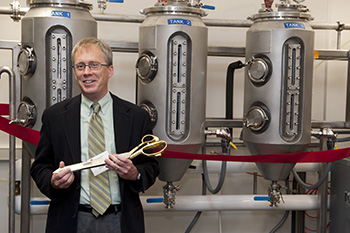
Professor Scott Rankin, chair of the Department of Food Science
Something is brewing in the Microbial Sciences Building on the University of Wisconsin-Madison campus.
On Friday, November 5, David Ryder, PhD, MillerCoors vice president of research and brewing, and other MillerCoors representatives participated in a ribbon-cutting ceremony for three fermenters installed in the Kikkoman Fermentation Laboratory on the building’s second floor.
The fermenter skid is MillerCoors’ second gift to foster the study of fermentation and brewing sciences in the College of Agricultural and Life Sciences (CALS).
“This is an exciting journey, and we’re just getting started,” Ryder said at the ceremony. “This strategic partnership will help us get the right kind of science, the right kind of technology and, most importantly, the right kind of people for the future.”
This strategic partnership will help us get the right kind of science, the right kind of technology and, most importantly, the right kind of people for the future.
David Ryder, PhD, MillerCoors vice president of research and brewing
As major brewers consolidate in the industry, “we are losing a lot of our research and development facilities,” he said. Partnering with the UW-Madison makes sense for developing brewing talent and advancing the science and art of fermentation.
The research conducted there will benefit not just beer but also the production of cheese, antibiotics, soy products and other sauces using fermentation. The potential exists “to make this the best university for this science” going forward, Ryder said.
Among those taking part in the ceremony were CALS Dean Molly Jahn; Professor Scott Rankin, chair of the Department of Food Science; and Professor Robin Shepard of the Department of Life Sciences Communication. Dean Jahn noted that the collaboration inspired by MillerCoors’ gifts to establish a pilot brewery in CALS has “brought us into new teams, new groups and new communities. They have contributed greatly to the excellent products coming out of this building, the largest academic building on campus.”
Rankin noted that researchers and students in the department have been documenting specialties such as the science and art of cheesemaking in Europe. “The dairy industry in Europe is on the wane,” and such knowledge is in danger of dying out, he said. Preserving and expanding upon knowledge in areas such as cheesemaking and brewing is about educating students and helping the industry at the same time. “This type of marriage is how that happens,” he said.
